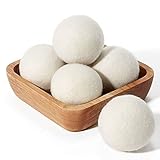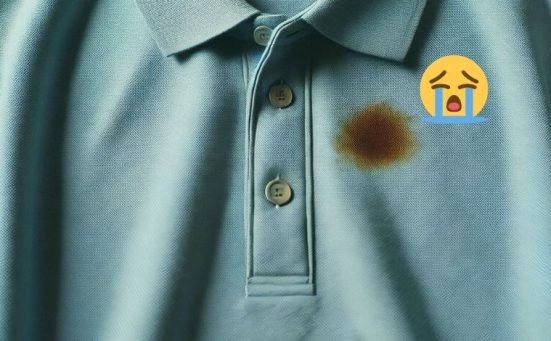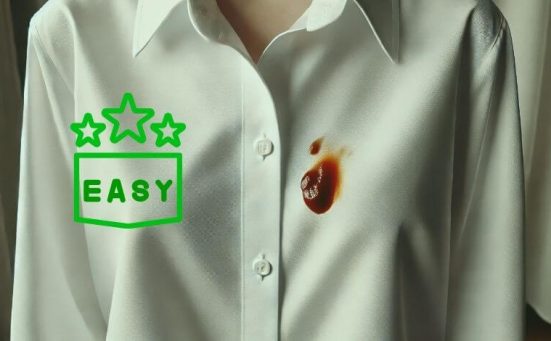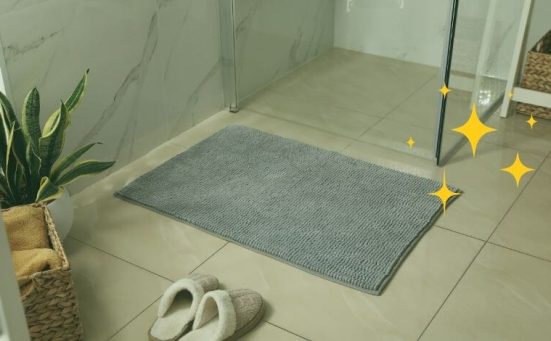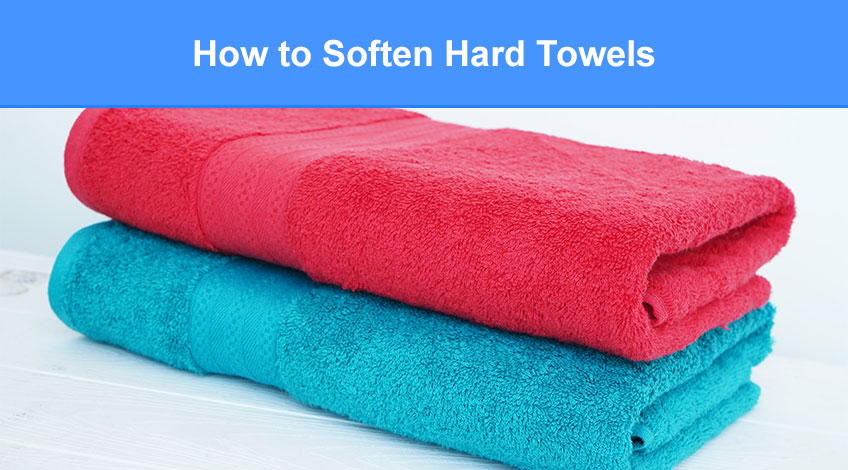
How to Soften Hard Towels: Easy Solutions!
Nothing beats that fresh soft feeling you get from a new bath towel. Sadly it doesn’t take long for that same towel to start to feel rough, hard and scratchy. If you’re looking for ways to soften your hard towels, keep reading.
What Causes Towels To Become Hard?
There are several factors that can cause your towels to become hard. They include;
- Mineral Rich (hard) Water
The undissolved mineral content of tap water, mainly calcium and magnesium can build up in the fibres of your towels and make them feel hard and scratchy. - Detergents
If detergents remain after washing and rinsing towels they can dry to become hard. The detergent acts like mini binding agents, much like concrete this makes the towel feel hard and scratchy. - Chemical Buildup
There are numerous chemicals that come into contact with our towels from naturally found chemicals in the water, to detergents and conditioners. All of which can cause towels to become hard. - Overloading The Drum
Towels need room to move around in the drum to allow the fibres to get fluffed up. If you force too many into the drum at once they will all get clumped together. This leads to them not getting washed properly and drying stiff, hard and scratchy. - Over Drying
If towels are subjected to too much heat when drying, they are likely to become hard.
Ways to Soften Towels
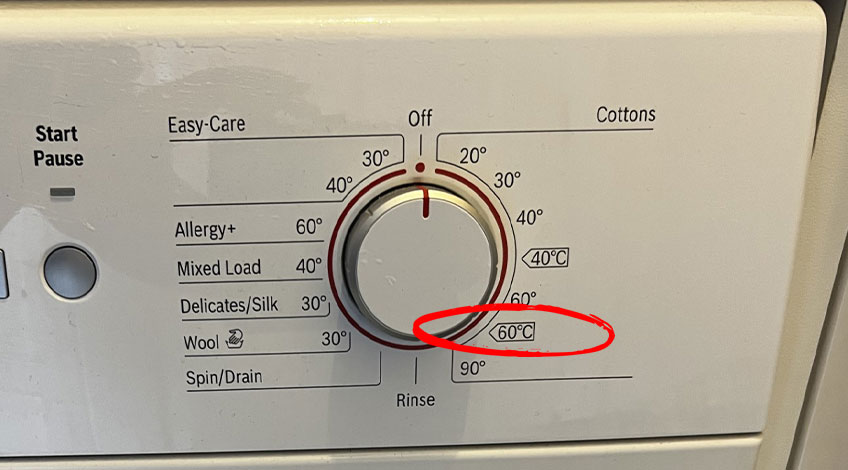
If your towels have become hard and scratchy don’t despair, because there are several things you can do to make them soft again. These include;
Wash Towels In The Hottest Water They Can Withstand
Hot water helps to remove dirt, oils and excess detergent from the towels. The recommended temperatures for towels is 60 degrees C for white towels and 40 degrees C for coloured or patterned towels.
Coloured and patterned towels should be washed at a lower temperature to prevent colour fade or running.
Use Fabric Softener
We don’t recommend using fabric softener every time you wash towels as this can lead to them becoming less absorbent. Which is bad from a functionality point of view and also due to the fact that for towels to get clean, they need to absorb water.
The water soaking into the fabric loosens the fibres allowing oils, dirts, stains and bacteria to flow out of the material.
To soften a towel that has become hard you should soak it in a solution of hot water (at the recommended temperature) with 1 cup of fabric softener. Soak the towel for about 60 minutes so that the towel absorbs lots of the mixture.
Then wash the towel in the usual way to remove as much of the fabric softener as possible.
Please Note: We recommend using fabric softener on towels as infrequently as possible to prevent the towel losing its absorbency.
Use White Vinegar
- ECO FRIENDLY NATURAL WHITE VINEGAR - Our vinegar has natural cleaning properties without any chemical components which could lead to nasty residue. Tradionally, Vinegar is the original & best cleaning product!
- MULTIPLE USES - With our white vinegar you can cook, clean, marinate, pickle, descale, and even soften fabric!
If you add ½ cup of white vinegar to the rinse cycle in your washing machine when washing towels, the vinegar will help to remove many of the harmful chemicals that have built up in the fabric.
This will make the towel dry softer. If you’re worried about the vinegar smell, using just ½ a cup in the first rinse allows the smell to be dissipated during the second rinse. Or you could add a few drops of your favourite essential oils to the wash load.
Use Bicarbonate Of Soda
- ECO-FRIENDLY: Sodium Bicarbonate / Baking Soda is one of the top eco-friendly , safe and inexpensive cleaning, baking and household products available.
- CLEANING: Baking Soda is particularly useful in food preparation, cleaning surfaces, ovens, grills, microwaves and fridges whilst also deodorising and freshening without leaving any harsh chemical smells.
When washing towels, add ½ a cup of bicarbonate of soda to the wash cycle. This will help to remove dirt, oils and chemicals. It will also help to remove any bad smells from the towels too.
Use A Hairbrush
This might sound ridiculous but does actually work. All you need to do is brush the towel using the hairbrush. Make sure you cover the whole of the towel.
It is time consuming and is best done alone unless you want people thinking you’re weird, but it definitely works.
Air Dry Towels On A Windy Day
Air drying is a great way to prevent towels getting hard but only if you dry them on a cloudy day or out of direct sunlight. The breeze will help soften the fibres and once dry, you should squeeze the towel with your hands to loosen the fibres.
Partially Tumble Dry Your Towels
If you have no choice but to use a tumble dryer to dry your towels, you should use a low heat and remove the towels before they are fully dry. You should then finish drying them naturally in the air either outdoors or indoors.
Use Dryer Balls
- Reduce Drying Time: Our wool dryer balls cut the drying time up to 25% by separating wet clothes, which allows warm air to circulate evenly and dry clothes faster, saving energy and money
- Anti-Static: These balls reduce static cling and make clothes soft and wrinkle-free for easy ironing
You can buy dryer balls or use clean tennis balls which can be placed in the dryer with the towels. As the drum spins, the balls bounce around and give your towels a good bashing. This will help to soften the fibres and make the towel softer.
Shake Towels
As you remove your towels from the washing machine and tumble dryer, you should give them a good shake. This helps to get them soft and fluffy again.
Ways To Prevent Towels Becoming Hard
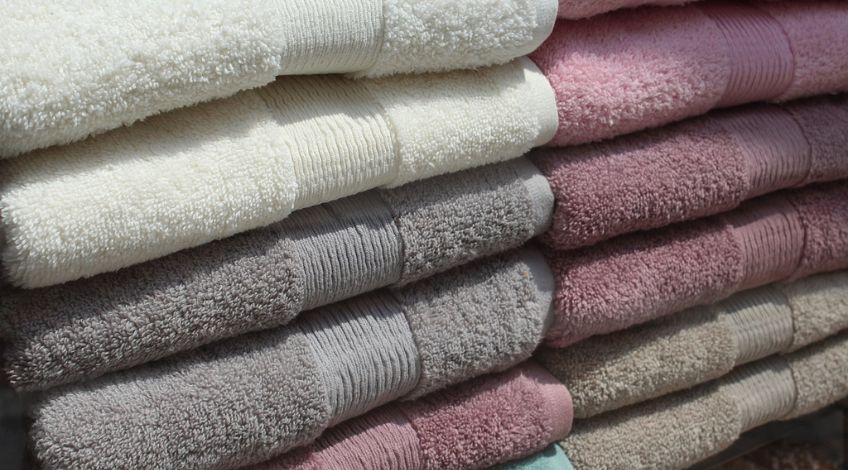
Once you’ve got your towels soft again there are a few ways to prevent them from becoming hard and scratchy again. They include;
Reduce The Amount Of Detergent Used
Detergents are concentrated formulas which can often be too strong for washing certain items including towels. Try reducing the amount of detergent you use when washing towels to prevent the excess drying into the fabric which leaves the towels dry and scratchy.
Too much detergent can also build up in the washing machine and breed germs, bacteria and mould as well as eventually causing the machine to break down.
Never Overload The Machine
Towels need space to move around in the drum so that they can absorb enough water to get clean properly. The same is true during the rinse cycle when it is vitally important that the detergent is all removed from the fabric.
This is also the case when tumble drying as well. The towels need to be able to move around freely to get dry.
Substitute Softener For White Vinegar
We mentioned white vinegar to help get towels soft again. It’s also great for preventing towels from becoming hard in the first place.
Instead of adding fabric softener, add ½ cup of white vinegar to the rinse cycle by tipping it into the fabric softener compartment.
Be Aware Of Hard Water
Hard water is very prevalent in the UK, in fact around 60% of the UK is classified as having hard water. You can buy water filters that remove some of the calcium or magnesium content from the water.
Or you could wash your towels using harvested rainwater. OK, this might be a bit of a stretch, but it would solve the problem. Using white vinegar is also a great way to combat hard water. You might need to add more than ½ a cup if you live in an area which has extremely hard water.
What Can You Do If Towels Get Hard After Drying?
This can happen if you allow the towels to dry too much, either on a line or in a tumble dryer. The solution is simple and yet ingenious. All it takes is a clean, damp cloth. Something like a tea towel or similar.
Just wet the tea towel and wring it nearly dry then dab the towel all over. This will loosen the fibres just enough to soften the towel. Once the towel is completely wet, put it back into the dryer for a few minutes to remove that extra moisture.
Some people swear by this method and it does work, it just seems slightly odd making a dry towel, that you’ve just purposely dried, wet again.
SEE ALSO: How To Use White Vinegar In The Washing Machine (and why!)
Frequently Asked Questions
There are a few reasons why your towels feel hard and stiff after washing. It could be; excess detergent has become dried into the fabric, a buildup of minerals from hard water, chemical buildup, overdrying, overloading the drum of your washing machine or tumble dryer or too much sunlight when air drying.
To make your towels softer and more absorbent you should wash them in as high a temperature as they can withstand, give them an extra rinse, use white vinegar instead of fabric softener, use bicarbonate of soda in the wash cycle, shake the towels or brush the towels with a hairbrush.
The best thing to soften towels with is white vinegar. Just add ½ a cup to the rinse cycle.
Also, follow us on Pinterest ...



